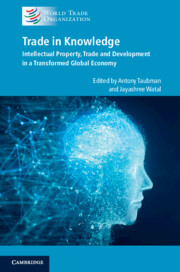Book contents
- Frontmatter
- Contents
- Figures
- Tables
- Contributors
- Preface
- 1 Thematic Overview: Charting the Evolution of Knowledge Flows
- Part I Conceptual Framework
- Part II Measuring Trade in Knowledge
- Part III Impact of Knowledge Flows on Trade and Development
- Part IV Policy, Regulatory and Legislative Frameworks
- Part V Looking Forward
- Index
11 - Cross-Border Knowledge Flows through R&D FDI: Implications for Low- and Middle-Income Countries
from Part II - Measuring Trade in Knowledge
Published online by Cambridge University Press: 17 February 2022
- Frontmatter
- Contents
- Figures
- Tables
- Contributors
- Preface
- 1 Thematic Overview: Charting the Evolution of Knowledge Flows
- Part I Conceptual Framework
- Part II Measuring Trade in Knowledge
- Part III Impact of Knowledge Flows on Trade and Development
- Part IV Policy, Regulatory and Legislative Frameworks
- Part V Looking Forward
- Index
Summary
R&D related foreign direct investments represent a powerful mechanism for cross-border knowledge sharing that can stimulate the process of technological catch-up. However, low-income countries and smaller middle-income countries remain largely excluded from this kind of global flows of knowledge. In this chapter, we discuss the motivations and implications of this type of FDI for low- and middle-income countries, building on a critical review of the existing literature, and analyze the trajectory of R&D FDI during the period 2003-2017 by region and industry. The data is used as a point of departure to discuss potential policies specially tailored for low- and middle-income countries and their capacity to attract and anchor R&D related FDI for technological catch up. The chapter concludes with an outline of a future research agenda.
- Type
- Chapter
- Information
- Trade in KnowledgeIntellectual Property, Trade and Development in a Transformed Global Economy, pp. 352 - 375Publisher: Cambridge University PressPrint publication year: 2022
- 2
- Cited by

